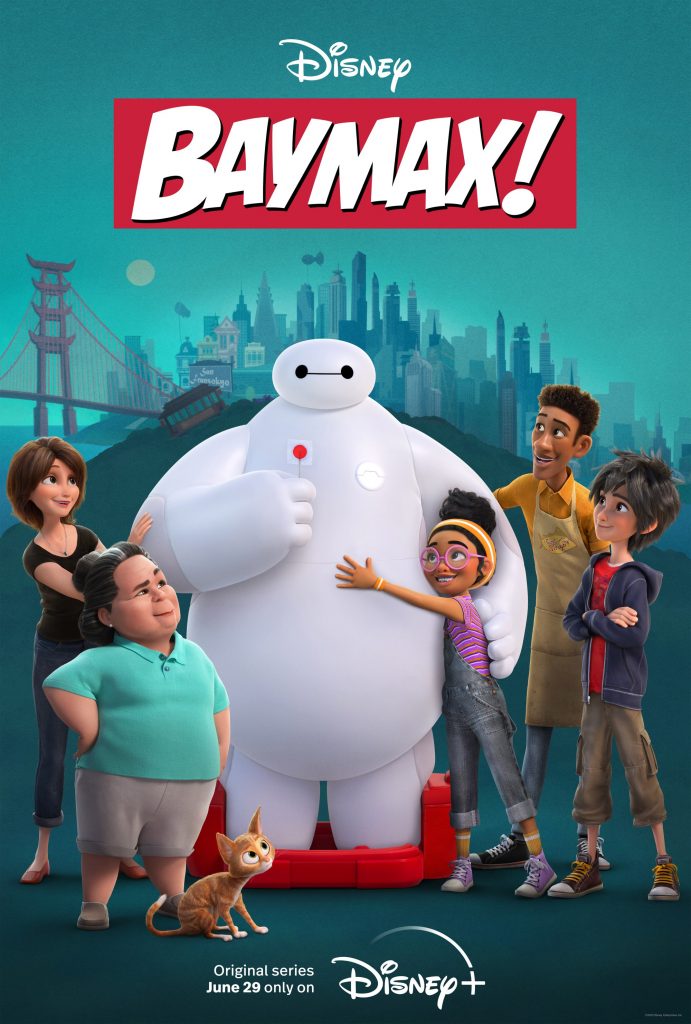Disney’s Baymax! sees everyone’s favorite inflatable healthcare companion set out to do what he was programmed to do: help others.
This new series of shorts spotlights the Big Hero 6 character in a new set of mini adventures. Baymax sets off into the heart of San Fransokyo to help as many people as he can. (Whether they want help or not.)
The series sees Scott Adsit return to voice Baymax. Maya Rudloph also reprises her role as Aunt Cass for select episodes.
A New Kind of Hero Welcomes You Back To San Fransokyo
Baymax is here, his battery is charged up, and he’s ready to welcome you back to San Fransokyo! It’s been nearly a decade since Big Hero 6 debuted in 2014. Big Hero 6 focused on superheroes, but Baymax! focuses on a different kind of hero: the healthcare worker.
Though the Baymax! series has undoubtedly been in the works at Disney for a while, there’s no denying our current climate makes this feel even more timely. Healthcare workers really are unsung heroes. And when they’re as adorable as a big inflatable marshmallow, well, that’s a win-win.
Honestly, I loved Baymax as a character in Big Hero 6, but I wasn’t sure about giving him a whole series. Could the kind-hearted comic relief carry his own show, without all the superhero action? I’m pleasantly surprised to say the answer is yes, he absolutely can!
Baymax! Is What I Want To See In Kids Media
Baymax! succeeds not just because it has an adorable, funny, and incredibly huggable-looking main character, but because of the way that character gives the series the space to deal with serious health concerns with humor and heart. Essentially, it’s jam-packed with really important lessons about health, but in a way that feels entertaining and relatable rather than preachy.

I love that Baymax! shows both kids and adults struggling with different health issues, and feeling unsure or afraid to confront those issues or get help. (In fact, the series shows Baymax helping even more adults than kids.) I think a lot of kids’ media frames problem-solving as simply a matter of “asking the adults for help,” when the reality might be that adults don’t have the answers or are even dealing with the same kinds of problems. If you’re a kid who’s scared of getting a shot, it’s actually kind of nice to see that some adults feel that way too. The messaging shift between “Be a big kid, don’t be scared, just do it” and “Grown ups are scared sometimes too, but it’s important we do this anyways” feels incredibly important.
It’s a dynamic you don’t see a lot in kids’ media. Or at least, it’s a dynamic I felt was often missing from media when I was growing up. One of my earliest media memories, still heavily ingrained in my mind, was an episode of Arthur where he injured himself playing at the dump. He wasn’t supposed to be there, so he didn’t tell his parents when he cut himself, and then the injury gets worse the longer he keeps the secret.
It’s intended to be a lesson about being honest and asking for help when you need it, especially when your wellbeing is concerned. But I remember twisting that lesson in my childhood mind, thinking if I lied to my parents I would inevitably be “punished” with some kind of injury. That if I was “good” and followed the rules, I could avoid getting hurt. Both the Baymax! series and this episode of Arthur want to encourage kids to seek help when they need it, but the approaches are a bit different.
(Also, to be clear, this is not meant as a dig of any kind to Arthur, which is an excellent kids program and essential to my childhood. Even if I still think of this darn episode every time I see the jagged-edged lid of a tin can.)

What I mean to say is Baymax! does a great job of exploring not just health issues, but of the fear and uncertainty surrounding them. In particular, the show goes to great lengths to show that these fears often have deeper roots than straightforward health concerns. For example, one of the episodes shows Baymax helping a girl who gets her first period. She’s concerned about the pain, sure. But what’s actually making her upset is the fear of how people are going to start treating her differently because of it – that she’s going to suddenly be expected to be “grown up.” Similarly, we see an episode with a man who refuses Baymax’s allergy shot because of a fear of needles. But we later learn he’s more afraid of how acknowledging his newly developed allergy will mean he has to change his life.
It’s an important lesson in the nuances of caring and compassion for kids and adults alike. For adults, it’s a reminder that kids’ feelings and fears are complex. (Is your five-year-old crying because of the physical pain of a scraped knee, or because the act of falling was scary?) For kids, it’s an acknowledgement that they can feel these things and still reach out for help. And for all of us, Baymax! is a reminder to approach others with kindness, patience, and love.

Baymax! ultimately ended up a series I didn’t know I needed. You’ll run through the six-episode season of shorts quickly, but the content will stick with you. When it comes to health, we can all benefit from a little more kindness and understanding. And Baymax is the perfect companion robot to deliver it.
Baymax! begins streaming on Disney+ June 29.

![Baymax: A Quick, Fun, & Surprisingly Nuanced Take On Healthcare From Your Favorite Inflatable Robot [Review]](https://www.thathashtagshow.com/wp-content/uploads/2022/06/Baymax-poster-1-1280x640.jpg)


